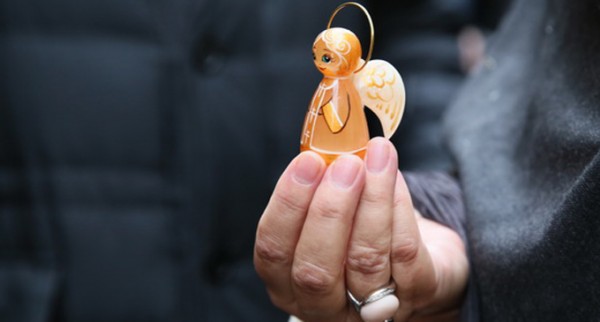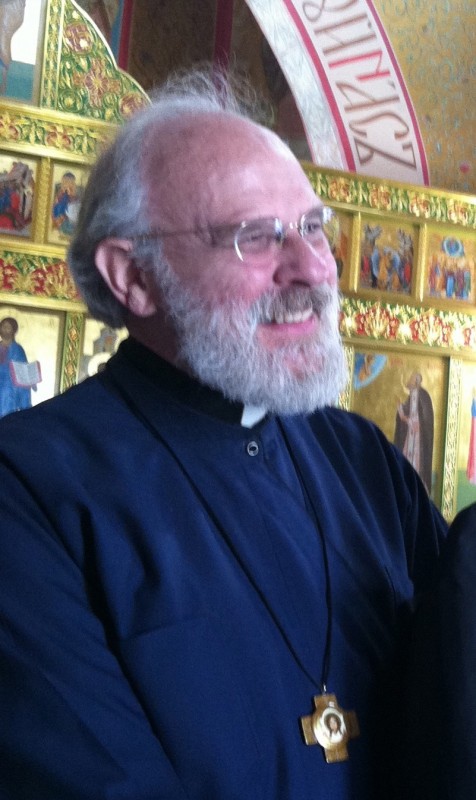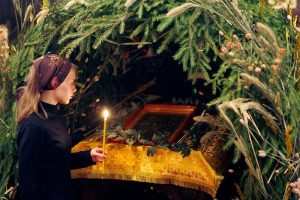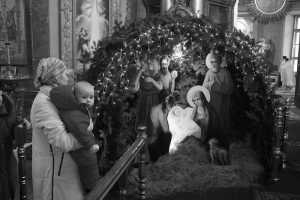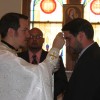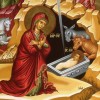Fr. Brendan Pelphrey is a priest of the Greek Orthodox Archdiocese of America, serves as presiding priest at St Sophia Greek Orthodox Church in San Antonio, Texas.
Christmas has already arrived at Wal-Mart, as in shopping malls and retail stores everywhere. It began as soon as Halloween, which was celebrated from August to the end of October, drew to an end. Overnight, plastic Santas and singing wreaths replaced orange candy on the shelves, and sound systems have begun to blare Frank Sinatra singing “Chestnuts Roasting on an Open Fire” over and over again. All this, euphemistically known as “the holiday season,” is supposed to cheer us through the winter, or at least dramatically increase retail sales–occupying the economy as well as emotions from November 1 until the last shopping day.
An important question is what Orthodox Christians are supposed to do during this season. Our tradition is to spend the weeks from November 15 until Christmas Day fasting in preparation for the Feast of the Nativity. We abstain not only from meat and fish and eggs and milk, but from parties and celebrations, loud music and worldly things. Our meditation is not on retail goods and shiny bicycles, but on the God-Man who redeemed humanity by His birth…right?
In reality “the holiday season” will insert itself into every aspect of our lives over the next two months. It is unavoidable. Orthodox children, like Jewish children and everyone else, will take part in school programs where they memorize secular songs about winter, along with traditional Protestant Christmas carols and (in some school districts) Hanukkah tunes and Kwanza’a poems. Orthodox adults will have to endure office parties with obnoxious drunks wearing fake antlers on their heads. Children will demand to see the elf movie, and wives struggle with the issue of what to do witt Uncle Spiro if he comes to spend the week of Christmas again this year. Like everyone else, we will find ourselves running from store to store to find the right gifts we can’t afford for relatives who don’t like us and for people we don’t really know.
Some Christians try to fight back at this time of year by wearing buttons that say, “Jesus is the reason for the season.” Others take the opportunity to show greater charity to the needy or to organize caroling at a nursing home or a hospital. But there are additional things we can do to deepen spiritually as well as to share the Orthodox Christian faith with our American culture. Here are some suggestions:
- Undertake a special Advent prayer-time in the home. Married couples can try rising during the middle of the night to say an abbreviated form of the Midnight Prayers (not more than ten of fifteen minutes), then return to sleep. This gives a sense of Christ coming again (“like a thief in the night”) and helps us to understand the scripture readings which form part of the church’s meditation during the weeks of Advent. Where there are young children, set up a small prayer-stand near the Christmas tree. At night, with the Christmas lights twinkling, chant part of the weekday Vespers before bed-time. (Our children used to fall asleep on the carpet during this very special time each evening–a “magic” time that they won’t forget.)
- Talk with people at the shopping mall. They are as tired as you are. Show kindness to perfect strangers, and they will respond. This is your opportunity to “be Orthodox, not just in name only, but really” (St. Ignatius Martyr, Letter to the Magnesians).
- Initiate dialogue with non-Christians. During this season especially there are followers of religious cults proselytizing in the shopping malls and on the sidewalks. (An example is SRF, “Self-Realization Fellowship”–a Hindu-based cult whose members hand out magazines, sometimes with pictures of Christ on the cover. They teach that the “Christ-spirit” really means our own cosmic awakening through practice of kriya yoga.) If someone hands you literature, accept it graciously and then ask about their beliefs. After listening respectfully, respond with the Gospel of Christ: that God took flesh and in doing so, redeemed humanity and the world. Tell them about Orthodox tradition; they will find it incredible that there actually are Christians who fast in preparation for Christmas!
- At the office, attend the party but cheerfully tell friends you can’t share in the drinks. Offer to bring the champagne or Greek wine after Christmas, when it really is time to celebrate. This gesture, if done with genuine humor and good will, can spark interest in the origins of Christmas and what it means to be Orthodox. Also, you may have an opportunity to cheer some fellow workers after Christmas, when they may be depressed after the holidays!
- Teach your children about Christmas. Read to them about the “real” Santa, the fourth-century St. Nicholas of Myra; and about St. Basil the Great, who gave the world hospitals and charitable institutions for the poor. This will equip your children to talk knowledgeably with friends at school, making them something of a celebrity. Ask them how they would like to carry out the saints’ generosity to the poor. Often, children have innovative and impressive ideas for how to show charity. But stress that this is something we can do all year long, not just during the celebration of Nativity.
- Finally, it is important to learn all you can about Christmas. In America today there are many half-truths or myths about Christmas which are cited as “facts” in conversations about religion. Examples currently on the Internet are the idea that early Christians borrowed the holiday from the Romans (a claim frequently made on radio by the late atheist Madalyn Murray; that Jesus was actually derived from a Persian god named Mithra; or that early Christians were ignorant about whether Jesus was really born in Bethlehem, or when He was born).
To respond to claims like these, Orthodox Christians should read carefully the Gospel accounts about the birth of Christ (Matthew ch. 1-2, Luke ch. 1-2) and know what they really say or do not say. For example, the Wise Men–who weren’t kings–were not present at the birth of Christ.













